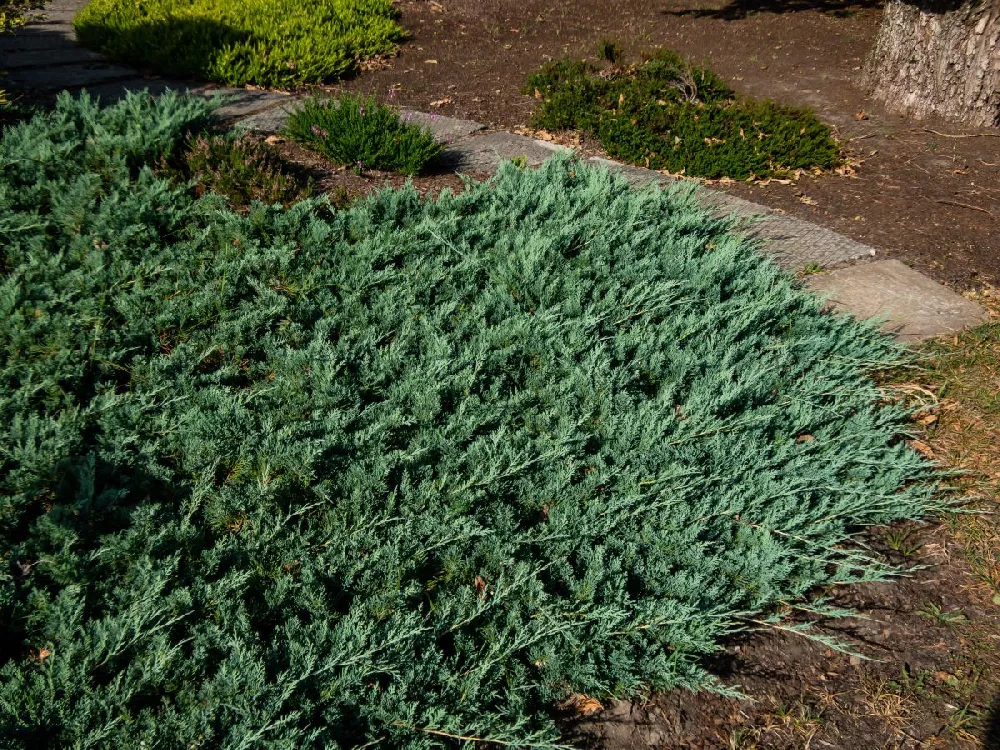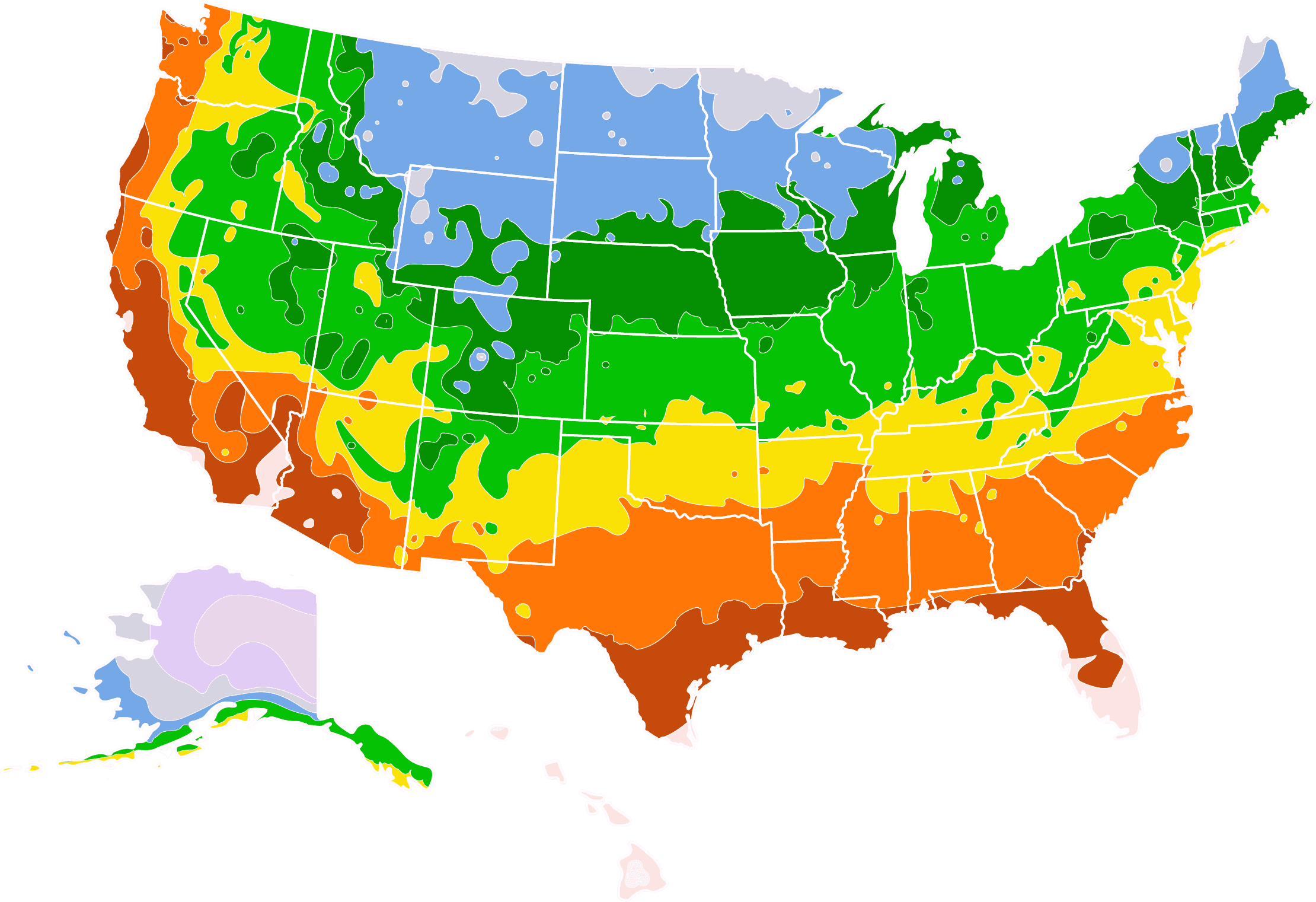- Home >
- Ground Cover Plants >
- Blue Rug Juniper
Blue Rug Juniper for Sale - Buying & Growing Guide
It is no mystery how the Blue Rug Juniper, or Juniperus horizontalis 'Wiltonii,' earned its very fitting common name. After a few years of healthy growth, a few Blue Rug Juniper plants can cover your garden beds with a dense and even blanket of bright blue textured foliage. Most gardeners also find that the Blue Rug Juniper is quite easy to care for overall and can show good drought tolerance once mature.
- The Blue Rug Juniper is an excellent ground cover with dense evergreen foliage.
- With the right care, this plant will likely remain disease-free.
- The Blue Rug junipers are ideal for slope plantings and can tolerate drought.
Enter your zip code to find nearby stores that may carry this plant.
Plant Care
Sunlight

A Blue Rug Juniper's growing location should receive six hours of daily sunlight or more.
Watering
Water monthly throughout the growing season. Be sure not to overwater this plant.
Fertilizing

Apply a nitrogen-rich fertilizer once per year during the early spring or the fall.
Planting and Care
Planting instructions
Occasionally, a Blue Rug Juniper can survive in partial shade, but this plant will grow much better where there is full sunlight. Regarding soil conditions, what’s most important for a Blue Rug Juniper is efficient drainage. This plant can adapt to many soil types, including soils of varying acidities. Once you find a suitable growing location, plant your Blue Rug Juniper in a hole that is as deep as the root ball is tall and about twice as wide.
Watering and nutrients
A well-established Blue Rug Juniper will have good drought tolerance. However, it remains beneficial to give this plant some water when there has been a significant lack of natural rainfall. Typically, it’s best to water your Blue Rug Juniper after it has not rained for a month or more. To feed this plant, you can apply a nitrogen-rich fertilizer or an organic soil amendment such as compost during either the early spring or at the end of the growing season in fall.
Pollination
Juniper plants come in male and female varieties, which means you’ll need at least one of each if you wish to conduct pollination. When male and female plants grow near one another, the male plant will open its cones to release pollen, which travels via the wind to the female plant, resulting in the development of a fleshy, berry-like, seed-bearing cone. However, while the Blue Rug Juniper is a female juniper, it often does not produce those cones as a result of it being a cultivated variety.
Pruning
In many instances, a Blue Rug Juniper will look great and remain relatively healthy without pruning. However, pruning aids this plant’s health, especially when it comes to preventing disease. Mainly, pruning that thins this plant’s foliage allows for better airflow, which lessens the odds of moisture-related diseases. You can also use pruning to perform some light shaping for your Blue Rug Juniper, and to remove any stem that is dead, damaged or diseased. The best time to prune this plant is during spring after the last frost has passed.
Pests, diseases and animals
Most diseases that will befall a Blue Rug Juniper will arise as the result of overwatering or poorly-draining soils. Either condition can cause excessive moisture, which can promote fungal infections. However, if you select a suitable growing location, provide the right amount of water, and prune this plant occasionally, disease issues will be unlikely to occur. Insects can be an issue in some cases as well. Some of the most common Blue Rug Juniper pests are aphids, bagworms and spider mites.
Achieving maximum results
You should not underestimate the durability of the Blue Rug Juniper. Essentially, as long as this plant does not grow in shaded areas or soils that hold too much water, it will likely thrive. The Blue Rug Juniper’s adaptability includes drought and deer resistance. It has the ability to survive in rocky soils and slightly polluted areas, as well. It is also an excellent plant for anyone who wishes to stabilize a slope or reduce erosion.
FAQs
What color is the foliage of a Blue Rug Juniper?
As the common name suggests, the textured foliage of the Blue Rug Juniper has shades of blue, but it can also show brighter hints of silver. Additionally, during the fall, it will typically darken its foliage. By the colder winter months, the foliage of this plant can be almost entirely purple. And while this purple tone can be quite a contrast to the lighter colors present during the growing season, it is not a sign of distress or poor health.
How tall is the Blue Rug Juniper?
In most instances, a Blue Rug Juniper will grow to be about half a foot to one foot tall at most. By contrast, this plant's spread is comparatively large, as it can reach about eight feet across. This natural growth habit makes the Blue Rug Juniper an ideal plant for anyone who wishes to add an easy-to-care-for evergreen ground cover to their garden.
Where can the Blue Rug Juniper survive?
The Blue Rug Juniper is hardy across a relatively broad range that includes areas as cold as zone three and regions as warm as zone nine. This hardiness allows gardeners in nearly all parts of the lower 48 states to grow this cultivar year-round outdoors. In nearly all cases, the minimal growing requirements for the Blue Rug Juniper will remain the same. With well-draining soils and bright sunlight for six hours per day or more, this plant is sure to thrive in your yard.
Compare Similar Products
You can't add more Product Name - Product size to the cart.
OK








